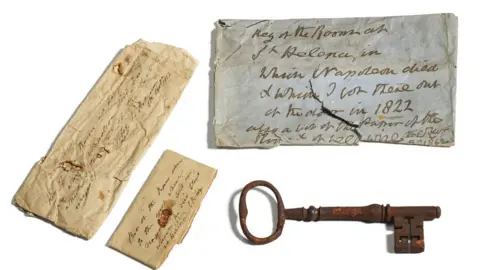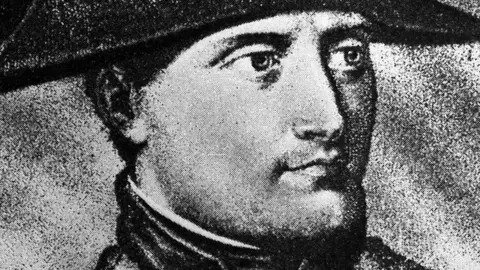Key to room where Napoleon died found in Scotland
 PA Media/Sotheby's
PA Media/Sotheby'sThe key to the room where Napoleon died is to be auctioned after it was found in Scotland.
The French emperor was held as a prisoner of the British on the island of St Helena in the South Atlantic after his defeat at Waterloo.
He died in 1821 and the bedroom key was taken by a British soldier and ended up in a country house outside of Edinburgh.
The Scottish descendants of the soldier have made the key available for sale.
It is being auctioned by Sotheby's and the key, along with the envelope and notes it was found with, are estimated to be worth up to £5,000.
Soldier Charles Richard Fox took the key from St Helena and gave it to his mother, Baroness Holland, a "super fan" of Napoleon.
She already had a collection of items connected to the Corsican-born former French statesman and military leader, including one of his socks.
Scottish descendants of the soldier and the baroness found the key while unpacking an old trunk.
David Macdonald, of Sotheby's, said: "We see things associated with Napoleon all the time, important pictures or furniture from one of his amazing houses or homes.
"But there's something about a key which, particularly as it comes from where he was incarcerated, is quite powerful, especially as it's the key to the room where he died.
"It's something otherworldly. It was as powerful and potent an object then as it is today."
 PA Media
PA MediaThe property at Longwood on St Helena where Napoleon was held was "not a prison cell by any means" and had some comforts, said Mr Macdonald, adding: "He was a respected foe."
He said it was not clear why Fox was on the island, but "he had the opportunity to take the key for himself or more likely, his mother.
"That's why it ended up at this house in Scotland with his descendants."
The key will go under the hammer at Sotheby's in London together with a piece of ageing yellow paper inscribed with Fox's note: "Key of the room at Longwood, in which Napoleon died".
Fox also wrote that he took the key out of the lock himself on 6 September 1822 when he visited following Napoleon's death.
